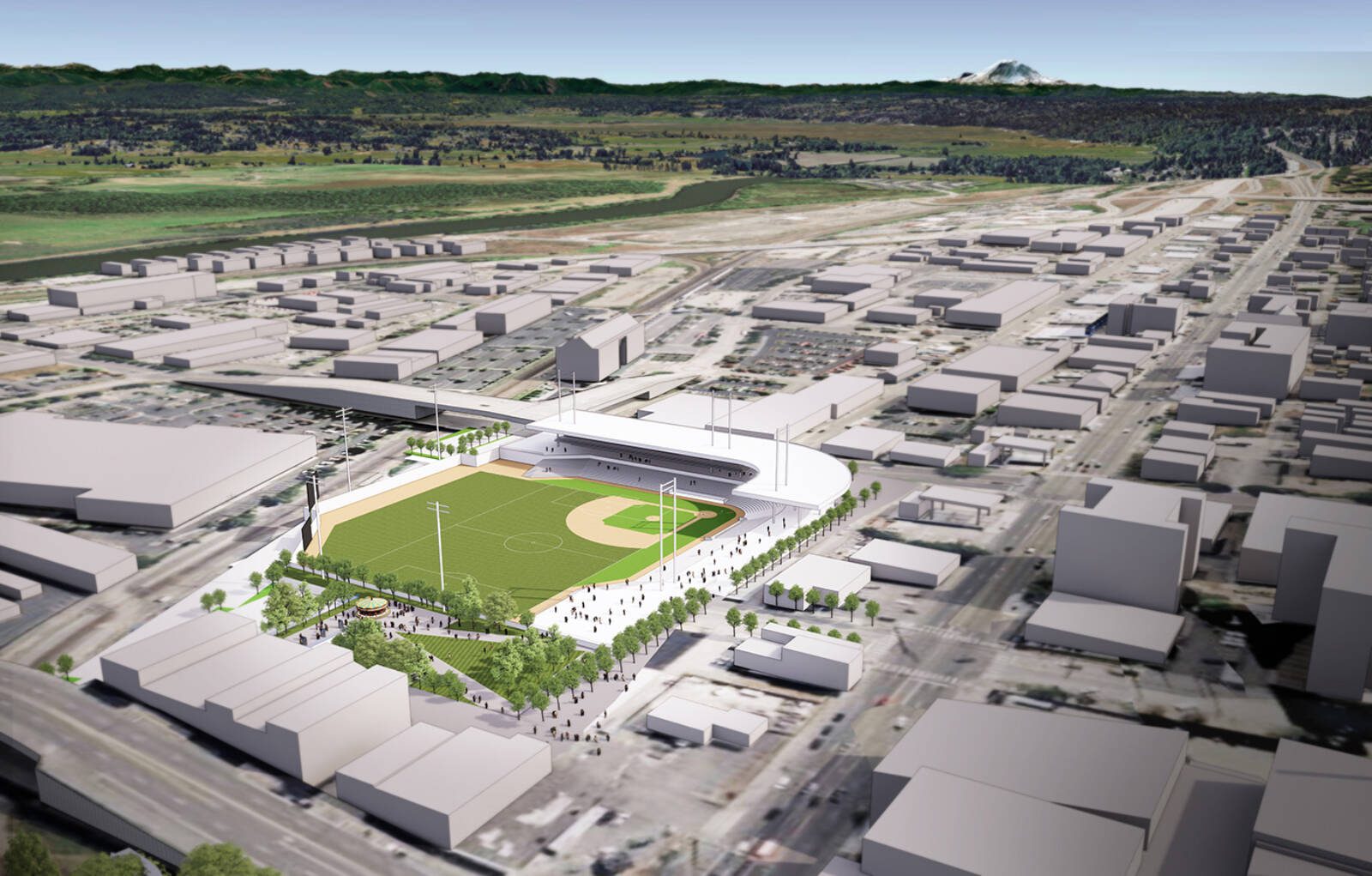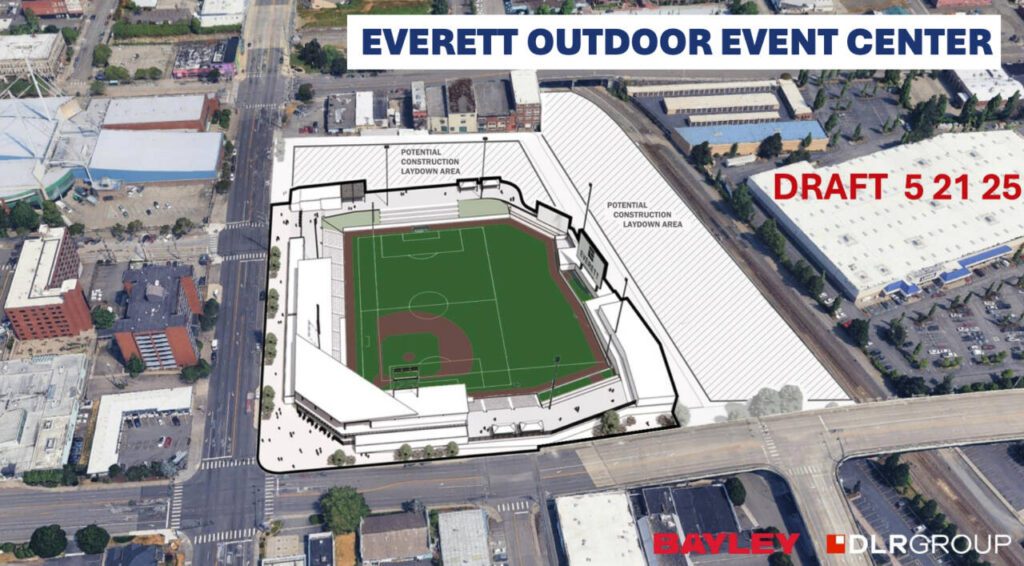By The Herald Editorial Board
A long-term future for professional minor league baseball and soccer in Everett is now in better focus following the release of estimates from city staff of $82 million for the project, covering property acquisition, design and construction for a multi-purpose field and stadium in downtown, as The Herald’s Will Geschke reported Friday.
Earlier estimates — literal and figurative ballpark figures — placed the potential costs between $84.4 million and $114.6 million — not counting an additional $18 million for property acquisition — for a new field and stadium that would be built along Broadway, adjacent to the Angel of the Winds Arena, with a home-plate entrance situated at the corner of Broadway and Pacific.
That estimate, like all estimates for public-private enterprises, is subject to cost increases, but the earlier decision by the city to pursue a “design-build” process — where the design and construction are managed in tandem to streamline the process and keep costs down — appears to have worked to peg the starting figure even below the low-end of the earlier projection.
Still $82 million isn’t peanuts, and the city of Everett is considering adding to the $1.8 million it already has invested, putting in as much as $7.25 million in one-time funding, about 9 percent of the project’s total cost, although none of that is expected to require general fund dollars or an increase in taxes for a city that has in recent years made difficult cuts to staff and services to meet budget.
Add to the city’s contribution $7.4 million from the state, $5 million from Snohomish County and intended contributions of $10 million from the Everett AquaSox club and $10 million to $15 million from the United Soccer League with its plans to bring men’s and women’s soccer teams to a new park.
The bulk of the project’s funding, however, will be built from municipal bonds that will be repaid from the revenue the stadium generates from baseball games, soccer matches and other events that — steps away from the Angel of the Winds Arena — will create a four-season entertainment district centered on Broadway and Hewitt Avenue, and a neighborhood that has room and opportunity for retail and residential redevelopment. The arrival of Sound Transit’s Link light-rail to Everett Station — just blocks away, if still a few years away — adds that catalyst to the economic mix.
All told, the public and private funding is expected to total, as determined by an earlier city report, about $95 million, keeping the latest estimate within reach.
Public taxpayers, through contributions from city, county and state, are contributing to this effort, but not without the expectation of economic benefit as well as public recreation and park amenities.
A look at what the Seattle Mariners-affiliated AquaSox have helped generate at Funko Field at Everett Memorial Stadium shows the potential for the new stadium. During its 2023 season the AquaSox’s 66 home games directly supported $10.7 million in business revenue, 90 jobs and $3.7 million in labor income, according to earlier city figures. Indirectly, those numbers improved to $13.7 million in business revenue, 130 jobs and $6.4 million in labor income for city residents.
The downtown site according to the economic study, could provide between $15.1 million to $21.7 million in business revenue and between 135 to 200 jobs.
Coming off FIFA’s World Cup matches in Seattle and “Fan Zone” events in Everett in 2026, the arrival of professional soccer in downtown Everett by 2027 — when the field could be ready for play — would seem perfectly timed to build on those numbers.
Those economics should be weighed against what could be lost if a new stadium is not built.
In a move in 2021 to improve working conditions and pay for its minor league players, Major League Baseball cut some 40 minor league teams from their affiliate agreements with big league teams, a move that kept the AquaSox in the Northwest League, bumped it up to the longer-season High-A designation, but imposed a punch-list of things that would have to be improved at its facilities for players and game officials.
The AquaSox owners missed a deadline last year to show a plan in place for meeting those requirements and paid a six-figure fine for the continuing delay. MLB and other cities are watching.
It’s not difficult to imagine Northwest cities — among them Yakima, Bellevue and Vancouver, Wash. — that could take advantage of Everett’s failure to move ahead. Eugene, Ore., currently the home of the San Francisco Giants-affiliate Emeralds, is expected to lose its team in coming years, following voter rejection of a general obligation bond last year.
The Everett City Council, at its June 11 meeting, will consider three ordinances related to moving the project along, although final decision to build the stadium won’t happen until design work is complete later this year or early next year. Among the decisions now, the council is expected to vote on a property acquisition ordinance regarding 16 parcels, most facing Broadway or Pacific Avenue. Following agreements on purchase or lease, the council would later vote to accept those deals. The city has pledged assistance to relocate businesses.
The city has pursued a “small ball” approach to keeping the AquaSox in Everett, infield hits and smart base-running, rather than relying on home runs. Approving the ordinances before the city council continues that game plan and allows some day-dreaming of what’s to come.
Early design renderings for the project show a classic and intimate “bandbox” baseball park, with seating for about 5,000, with some quirks built in, specifically a left-field wall that could be 345 feet deep to accommodate the length of a soccer pitch; that’s about 15 feet deeper than the 330-foot left-field wall at Funko Field, and deeper than the Seattle Mariners’ 331-foot left-field wall at T-Mobile Park. But for those who dig the long ball, right field looks to be more homer friendly, similar to Funko’s 325 feet.
On a summer evening, imagine taking in chatter from players and fans, between-innings mascot races, passing freight train horns, beer and hot dogs and views of Mounts Pilchuck and Baker.
Funko Field — determined last year not to be as economically feasible for renovation as would be building a new park — will be remembered for helping local owners support a successful minor league team for the last 40 years.
But only a new home can keep the AquaSox in Everett, support the arrival of two soccer teams and carry on Everett’s sporting culture.
Talk to us
> Give us your news tips.
> Send us a letter to the editor.
> More Herald contact information.


























